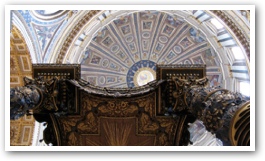Holy Days of Obligation
- FR. WILLIAM SAUNDERS
I am confused over Holy Days of Obligation. Last year, January 1 was not a holy day of obligation, but this year it was. A friend even argued with me that we did not have to go to Mass because the rule had been changed. What's up?
 |
Recently, many people have been confused over "holy days of obligation." Strictly speaking, the Church specifies certain holy days with the obligation of attending Mass. According to the Code of Canon Law, Easter Sunday, the day we celebrate the resurrection of our Lord, is always observed as the foremost holy day of obligation for the universal Church. The Code also lists 10 other holy days of obligation: Christmas; the Epiphany; the Ascension of our Lord; the Solemnity of Corpus Christi (the Most Holy Body and Blood of Christ); the Solemnity of Mary, Mother of God; Mary's Immaculate Conception; her Assumption; the Solemnity of St. Joseph; the Solemnity of St. Peter and St. Paul; and All Saints Day. The Code notes that the conference of bishops can reduce the number of holy days of obligation or transfer them to Sunday with the approval of the Holy Father. (Confer Canon 1246.)
In our country, Epiphany is transferred to the Sunday after January 1 (this year, Sunday, January 5), and Corpus Christi is transferred to the Sunday after Pentecost. At their November 1991 meeting, the National Conference of Catholic Bishops in the United States decided to retain as holy days of obligation the Solemnity of Mary, the Mother of God (January 1), Ascension Thursday (40 days after Easter), the Assumption of Mary (August 15), All Saints Day (November 1), the Immaculate Conception (December 8), and Christmas (December 25). The Vatican confirmed this decision on July 4, 1992 with the effective date being January 1, 1993.
However, whenever the Solemnity of Mary, the Mother of God, the Assumption, or All Saints Day falls on a Saturday or on a Monday, the obligation to attend Mass is dispensed, meaning that the day is still a "holy day" but a person is not required to attend Mass. For example, in 1995 Christmas fell on Monday and was a holy day with the obligation to attend Mass; on the other hand, the Solemnity of Mary, mother of God (January 1, 1996) also fell on a Monday and was a holy day but without the obligation to attend Mass.
Here is another glitch: Two solemnities which honor our Blessed Mother Immaculate Conception (which is celebrated during Advent) and the Assumption — are transferred to the following Monday if they fall on a Sunday. If a holy day is transferred to another day, the obligation is not transferred with it. For example this past year, Immaculate Conception technically fell on Sunday, December 8, which would have conflicted with the Second Sunday of Advent; therefore, it was celebrated on December 9 as a holy day, but without the obligation to attend Mass.
I do indeed fear that this new schema for holy days has lessened their importance in the minds of many people. Nevertheless, we should not forget the importance of these holy days, whether or not there is the "legal" obligation to attend Mass. The Constitution on the Sacred Liturgy of the Second Vatican Council stated, "Thus recalling the mysteries of the redemption, [the Church] opens up to the faithful the riches of her Lord's powers and merits, so that these are in some way made present for all time; the faithful lay hold of them and are filled with saving grace" (#102). Therefore, the importance of attending Mass on Sunday or any other holy day is not simply because of an obligation, but why it is an obligation. Our lives are so busy, and we face so many distractions. We could lose sight of God or become numb to His presence. Perhaps we do have to sacrifice to attend Mass by rearranging our schedule or suffering some inconvenience to the normal course of life. So what? Our cherishing the mysteries of our salvation should take precedence over the exigencies of living in this world. Remember at the Last Supper, Jesus reminded the apostles that while they live in the world, they are not of this world (John 17:1319). The holy days help us to remember the same. Therefore, we must pause to ponder, celebrate, and live the mystery of salvation by marking each Sunday, these special holy events, and the lives of those who are exemplars of faith with the offering of the Holy Mass.
 This is Meaghen Gonzalez, Editor of CERC. I hope you appreciated this piece. We curate these articles especially for believers like you.
This is Meaghen Gonzalez, Editor of CERC. I hope you appreciated this piece. We curate these articles especially for believers like you.
Please show your appreciation by making a $3 donation. CERC is entirely reader supported.

Acknowledgement
Saunders, Rev. William. "Holy Days of Obligation." Arlington Catholic Herald.
This article is reprinted with permission from Arlington Catholic Herald.
The Author

 Father William Saunders is pastor of Our Lady of Hope parish in Potomac Falls, Virginia. He is dean of the Notre Dame Graduate School of Christendom College. The above article is a "Straight Answers" column he wrote for the Arlington Catholic Herald. Father Saunders is the author of Straight Answers, a book based on 100 of his columns, and Straight Answers II.
Father William Saunders is pastor of Our Lady of Hope parish in Potomac Falls, Virginia. He is dean of the Notre Dame Graduate School of Christendom College. The above article is a "Straight Answers" column he wrote for the Arlington Catholic Herald. Father Saunders is the author of Straight Answers, a book based on 100 of his columns, and Straight Answers II.




